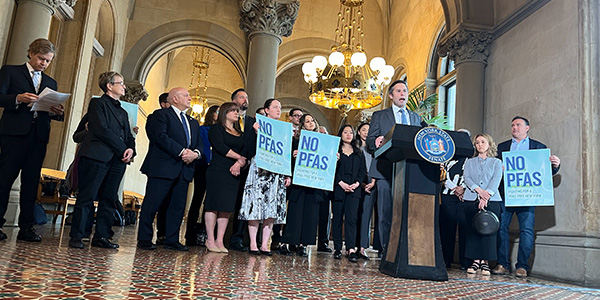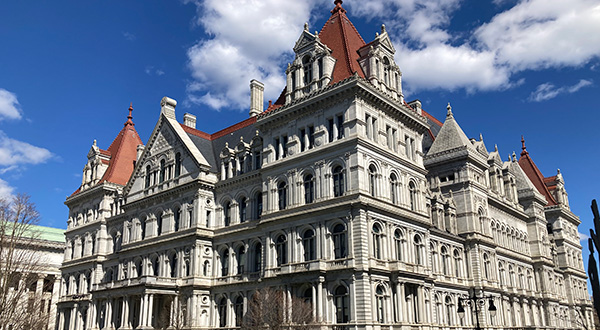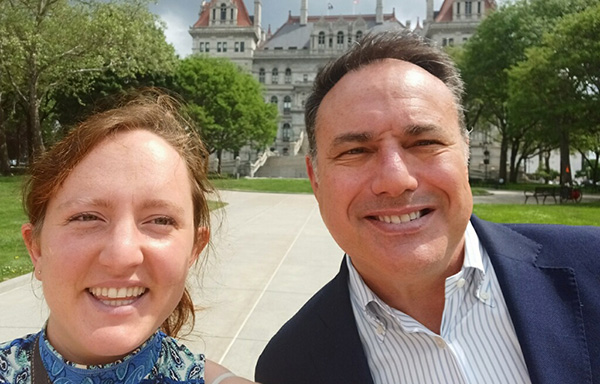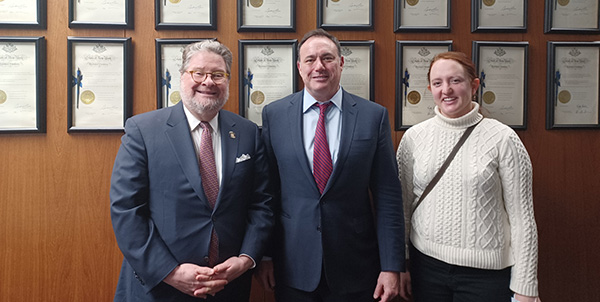
Ella McGrail spent the 2024 legislative session as the New York policy intern for Save the Sound.
The front entrance of the New York State Capitol is impressive.
It is comprised of three enormous doors flanked by columns and crowned with copper lamps. The stairs leading up to the doors are made of gleaming white marble, hand carved with flowers, leaves, and animals by 19th century artisans. It is a fitting entrance for a seat of democracy: open and inviting and utterly selfie-worthy.
The thing is, you can’t actually enter the Capitol that way. The steps are structurally unsound and blocked by a fence.
These doors are an apt metaphor for what I’ve learned of Albany politics over the last six months: the way in is seldom obvious.
I became Save the Sound’s legislative policy intern in January, which meant I’d landed my dream job at the ripe old age of 24. I’ve wanted to be an environmental advocate for as long as I can remember, even subjecting myself to the perils of grad school to achieve that end.
My excitement was tempered, however, by the fact that I had absolutely no idea what I was doing. My credentials were three quarters of a graduate degree in public policy and a few years working for my undergrad’s sustainability office. I had no experience working in New York politics. My new Save the Sound colleagues reassured me that I didn’t have to be an expert yet and would learn as I went.
Half a year later I am still far from being an expert, but I have picked up some tips that I hope will be helpful for anyone else planning to champion their cause in Albany’s halls of power.

My days at the Capitol go something like this:
I start by parking in what I’ve identified as the cheapest downtown parking garage (South Pearl Street), then climb the hill to the Capitol in professional but comfortable shoes—an important balance to strike when you’re about to meet a lot of important people whose offices never seem to be close to one another. Heels are not wise.
I found out the hard way that one does not simply walk into the Legislative Office Building (LOB) on a session day any more than one strolls into Mordor, unless you want to risk getting stuck in a security line destined to make you late to your first meeting. Instead, I enter the Capitol through a side door and pass quickly through a less-trafficked checkpoint.
The bag I send through the scanner contains my standard toolkit: notebook, pens, folder for storing literature on the bills, several Long Island Sound Beach Reports in case I run into a Sound-adjacent legislator who is unfamiliar with our work, a snack in case there is no time for lunch, and of course, a full reusable water bottle.
(While the LOB sports multiple water fountains, not a single one is functional, an irony that has haunted me all session as I dash through the halls advocating for water protection. A fellow activist informed me that the closure is a result of high lead levels in the building’s pipes.)
Once through security, I go down the escalator and through the underground hallway that connects the Gilded Age grandeur of the Capitol to the Soviet austerity of the LOB. Why one of these buildings was awarded loving design and a price tag twice that of the D.C. Capitol and the other looks like the set of a dystopian thriller, I haven’t the slightest idea. The environmental advocates tend to congregate on the third-floor terrace of said dystopian set, which at least has windows.
It is here that I meet up with David Ansel, my boss and Save the Sound’s Vice President of Water Protection. Diving into the Albany political scene as a complete novice would have been much more intimidating without David, whose patience and gregarious nature sets everyone around him at ease. We take advantage of the time before meetings to talk strategy for the day, and to pick the Italian restaurant we are going to sample that evening as a reward for our hard work; Albany has a surprisingly high-quality selection.

I’m usually in the Capitol for a lobby day, which is when advocates and citizens from across the state gather to support a particular bill or issue. These days typically start with remarks from bill sponsors and from the activists leading the event while the participants fuel up on complimentary muffins and coffee. Then we split into teams to go and meet with legislative offices.
Meetings tend to be cordial, with the activists presenting the benefits of bills they support and answering any questions the legislator or staffer may have about them. In one memorable meeting, an Assemblymember was shocked to learn the brand of floss he uses is pure PFAS, a toxic chemical we spent the session pushing to remove from common household products.
The best way to prepare for these meetings is to know as much as possible about the bills, particularly where they are in the legislative process and who is sponsoring them. Legislators often rely on one another’s judgments, so sometimes all it takes to get them to cosponsor is showing them that another legislator they respect has already signed on. Think wildebeests crossing a river.
If you’re lucky you may garner new support for your bills, but even when that doesn’t happen, I find the connections forged with my lobbying team to be extremely valuable. I’ve met wonderful environmentalists from all over New York who are happy to share their wisdom and connect with Save the Sound for future projects.
But the most interesting encounters usually occur between meetings. Waiting for the elevator in the Capitol, I met a woman struggling with thyroid issues because her town’s water supply was contaminated by firefighting foam (full of PFAS). During a rally, I spoke to a representative from the Chinese-American Planning Council, whose organization sent him to Albany out of concerns about flooding and air quality. In an LOB hallway, with the help of Microsoft translate, I spoke to a group of Spanish-speaking recyclers from New York City who make a living cashing in bottle deposits.
I’ve run into people dressed as the Statue of Liberty, blackbirds, and giant plastic bags; religious leaders delivering prayers in flowing robes, advocates for every issue imaginable, and even movie stars. My advice? Talk to them all, no matter how wacky the outfit. You will always learn something, and you might make an important connection.

These lessons learned helped a lot during my brief tenure, but many Albany doors still remain hidden to me,
Several times over the course of the session I’ve seen important environmental bills killed or watered down, despite having majority support in both houses, simply because some unidentifiable higher power is against them. I once spent an hour running around the Capitol, trying to figure out the time and location of a meeting that was allegedly open to the public. In committees and during session, David and I watch bills pass without debate and wonder where the negotiations are happening if not in the public-facing arena.
Where are decisions really made? What methods are actually effective in getting bills passed? Who do you have to talk to to really get things done? These should not be mysteries in a democratic government.
Figuring that out is all part of the process, I guess. David, in fact, and many of my Save the Sound colleagues have been scaling that same learning curve over the last two legislative sessions. It’s become clear to me just how important it is to build strong relationships with legislators, staff, and our counterparts at fellow organizations in order to break through in Albany. A big part of developing those relationships is being physically present, something I’ve had the privilege to do this session, which ended in the early hours of Saturday morning.
All along, I’ve felt like I’ve landed my dream job. I’ve spent my days in one of the most beautiful buildings in the country fighting for what I believe in alongside other passionate individuals. Plus, did I mention the complimentary muffins?
Environmental activism can be difficult because it confronts existential threats to the human race: if we do not act fast enough to prevent climate change and stem pollution, humanity and the rest of life on earth are in serious trouble. What can one person, or even a group of people, do about that? On that point, I defer to the words of Margaret Mead:
“Never doubt that a small group of thoughtful, committed citizens can change the world; indeed, it’s the only thing that ever has.”
I believe this is the key.
